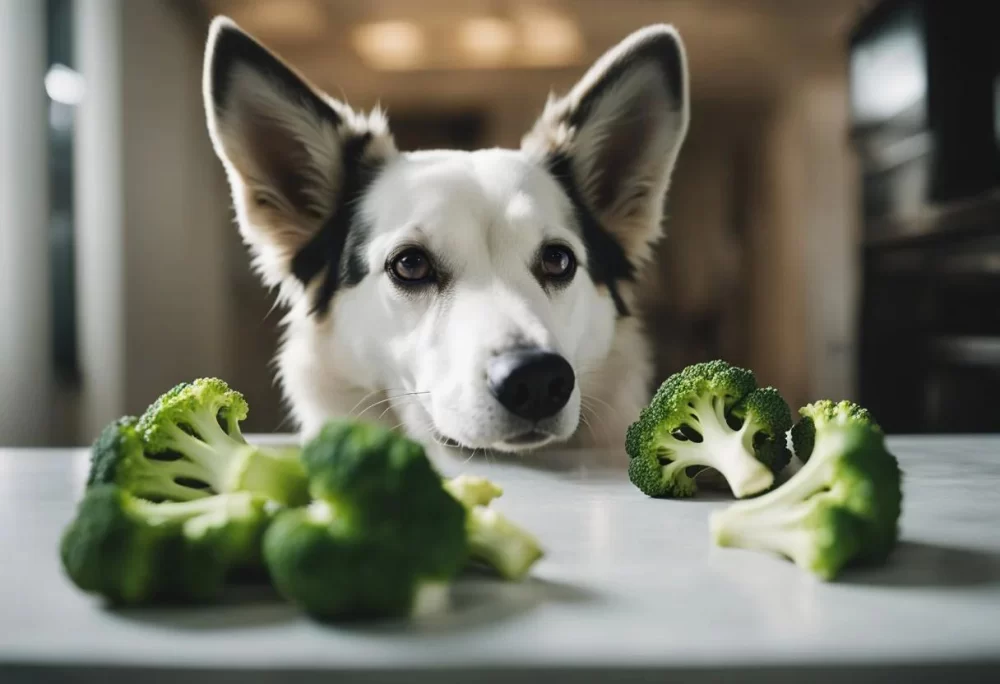Can Dogs Eat Broccoli? Unveiling the Truth About This Veggie
As dog owners, we're always looking for ways to keep our furry friends healthy and happy. One of the most common questions we receive from pet owners is: "Can dogs eat broccoli?" The simple answer is yes, dogs can eat broccoli. However, like any new food introduced to your dog's diet, there are some important factors to consider. In this article, we'll explore the health benefits, potential risks, and tips on feeding broccoli to dogs. So let's dive into this crunchy, nutritious vegetable and discover how it fits into your dog's diet!

286 Wilmington West Chester Pike, Chadds Ford, PA 19317, USA
See DetailsThe Health Benefits of Broccoli for Dogs
Broccoli is packed with essential nutrients that can support your dog’s overall health. Rich in vitamins, minerals, and fiber, this veggie can serve as a beneficial addition to your dog's diet when fed in moderation. Here are some of the key health benefits of broccoli for dogs:
- Vitamins and Nutrients: Broccoli is a great source of vitamins C and K, which can help strengthen your dog's immune system, improve bone health, and support their metabolism.
- Rich in Fiber: The fiber content in broccoli helps to support your dog’s digestive health, improving bowel movements and preventing constipation.
- Antioxidants: This veggie contains antioxidants, which help neutralize free radicals in your dog's body, potentially reducing the risk of chronic diseases.
- Low in Calories: Broccoli is low in calories, making it an excellent snack choice for dogs who are watching their weight.
- Supports Eye Health: Broccoli contains beta-carotene, which can promote good vision and prevent eye-related issues in dogs.
How to Safely Feed Broccoli to Your Dog
While broccoli is generally safe for dogs, it is important to prepare and serve it properly. Here's how you can introduce this nutritious vegetable into your dog’s diet:
- Steam or Cook It: Raw broccoli can be tough on your dog's digestive system, leading to potential stomach upset. It's best to steam or lightly cook broccoli before offering it to your dog.
- Serve in Small Portions: Like any treat, moderation is key. Serving too much broccoli can cause gas, bloating, or an upset stomach due to its high fiber content. Start with small amounts and see how your dog reacts.
- Remove the Stems: The stems of broccoli can be hard to digest for dogs and may pose a choking hazard. Always cut the broccoli into small, manageable florets, and remove any tough stems.
- Watch for Signs of Allergies: Although rare, some dogs may have a sensitivity or allergy to broccoli. Keep an eye out for signs like vomiting, diarrhea, or itching. If any of these symptoms occur, discontinue feeding broccoli and consult your veterinarian.
What to Consider Before Feeding Your Dog Broccoli
While broccoli has many health benefits, it's important to remember that not all dogs are the same. Before adding broccoli to your dog’s diet, here are a few things to keep in mind:
- Size Matters: Larger dogs may tolerate broccoli better than smaller breeds, but that doesn’t mean smaller dogs can’t enjoy this veggie too! Just be sure to cut the pieces into smaller bites for easy consumption.
- Balance is Key: Broccoli should be considered a treat or supplement to your dog’s regular food, not a replacement for their primary nutrition. Ensure your dog’s overall diet is balanced and appropriate for their breed, size, and activity level.
- Consult Your Vet: If you're uncertain about introducing a new food, such as broccoli, it's always a good idea to consult your vet. They can provide personalized advice based on your dog’s specific needs and health conditions.
Potential Risks of Feeding Broccoli to Dogs
Although broccoli is generally safe, there are a few potential risks to be aware of:
- Gastrointestinal Issues: Broccoli contains a compound called isothiocyanate, which can cause gas or bloating in dogs if consumed in large amounts. This is especially true if the broccoli is not prepared correctly.
- Choking Hazard: As mentioned earlier, the stems of broccoli can be tough and difficult to chew, which may present a choking risk. Always cut the broccoli into small, manageable pieces to avoid this issue.
- Thyroid Health Concerns: In rare cases, large amounts of cruciferous vegetables, including broccoli, can interfere with thyroid function in dogs. However, you'd have to feed your dog an excessive amount for this to be a concern.
Can Dogs with Health Conditions Eat Broccoli?
For dogs with certain health conditions, such as kidney disease, it's crucial to monitor their diet closely. While broccoli is generally safe for most dogs, those with underlying health issues should avoid certain foods, including broccoli, or only consume it under the supervision of a veterinarian.
For example, dogs with kidney disease may have trouble processing high-potassium vegetables like broccoli. It's always best to consult with your vet before introducing any new food if your dog is dealing with a chronic health condition.
Broccoli as a Training Treat: A Healthy Alternative
If you’re looking for a healthy treat to use during training sessions, broccoli can be a great choice! It’s low in calories, full of nutrients, and a fun way to introduce variety into your dog’s training routine. Just make sure to break it into small, bite-sized pieces that are easy for your dog to chew. Plus, they’ll love the crunch!
Real-Life Stories: Dogs and Their Love for Broccoli
Many dog owners have shared heartwarming stories about how their dogs love broccoli. Take, for example, a Golden Retriever named Max who has a taste for healthy snacks. His owner started offering him small pieces of steamed broccoli as a reward after training sessions. Over time, Max began to recognize the broccoli as a sign of positive reinforcement, eagerly waiting for his healthy treat. This little act not only improved his training but also gave him a delicious and nutritious snack!
Another example comes from a French Bulldog named Bella. Bella was a bit more selective about her treats, but when her owner introduced broccoli, Bella instantly took to it. Now, she enjoys broccoli as part of her regular treat rotation. Her owner loves that it helps keep Bella’s weight in check while providing extra nutrients!
These real-life stories prove that with the right approach, broccoli can be a fun and healthy addition to your dog’s diet.











